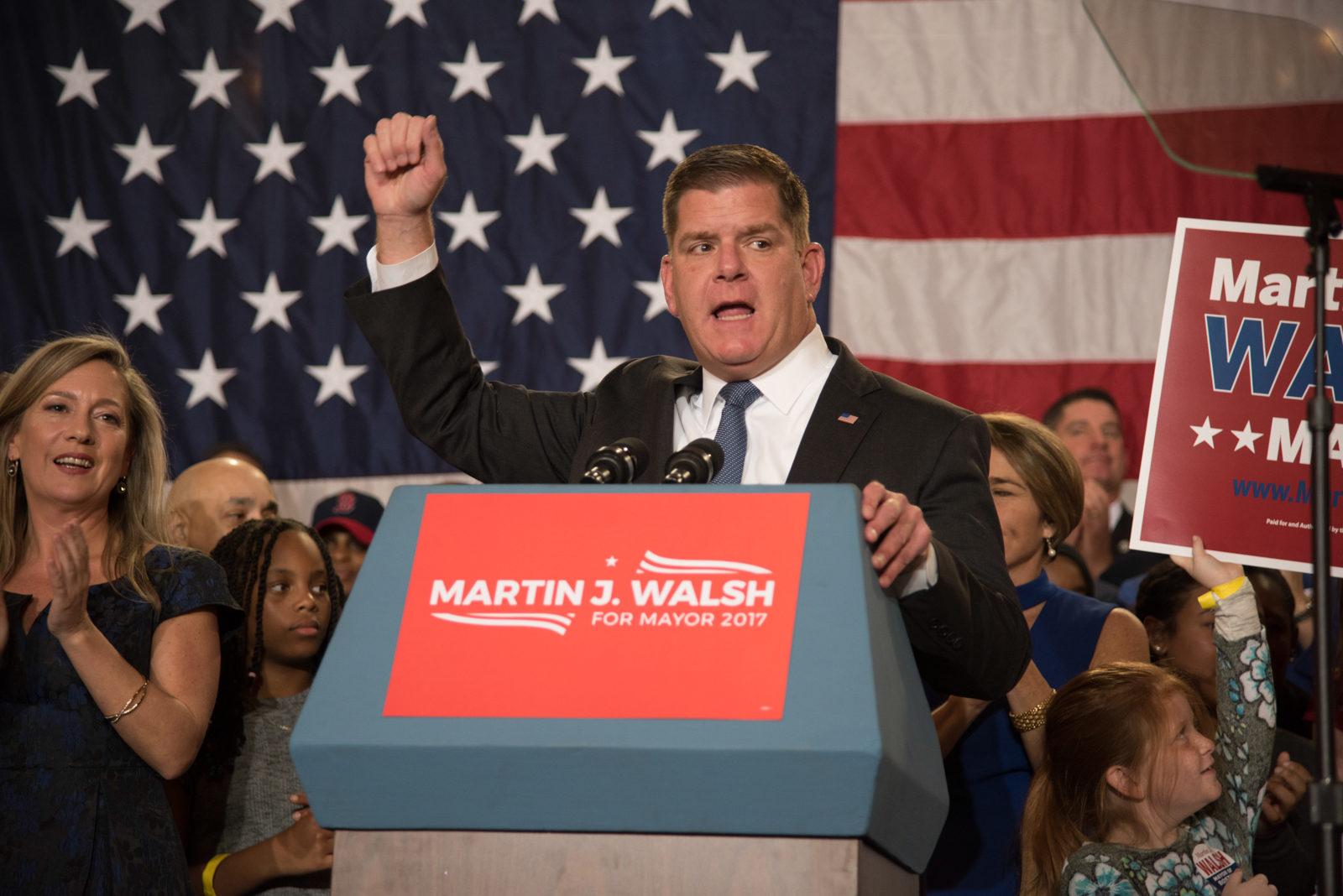[mediagrid cat=”45230″]
By: Hannah Schoenbaum, Michael Reddy, Shannon Larson and Andres Picon
Just under an hour after the Boston polls had closed, it became clear that incumbent Mayor Martin Walsh had won re-election — with about 65 percent of the vote, Walsh slid past challenger City Councilor Tito Jackson into his second term.
City officials reported only 28 percent of registered voters headed to the stations to cast their ballot for the municipal election. Approximately 70,125 individuals moved to re-elect Walsh, while only 36,433 residents voted for Jackson.
Once the official announcement had been made, Walsh started off his victory speech by thanking his supporters for the opportunity to make Boston a place where all people can thrive in his upcoming term.
“Today, I am more determined than ever to make Boston a city where everyone’s dream can come true,” Walsh said to the overpacked room at the Fairview Copley Plaza Hotel.
He expressed his dedication to the immigrants who chose Boston as their home, vowing to celebrate their heritage and welcome new residents to all neighborhoods.
“Immigrants seeking a better life choose Boston,” Walsh said. “They risk everything to come to our city, and I will always have their back.”
Equal opportunity will be the administration’s focus over the next four years, Walsh said. Campaigning allowed him to hear the stories of residents who were struggling to afford housing in the city and this motivated him to make significant changes in his second term.
Walsh told his supporters he will not allow economic disparities to prevent families from obtaining affordable housing.
“A city must be for all people,” Walsh said. “Affordable, working family housing needs to be built in our city. So, we’re going to keep building homes for all of us.”
The quality of the Boston Public Schools system was also raised as a concern by locals, Walsh said, and to address those concerns, Walsh said he would make improvements in education a priority — with free pre-kindergarten programs implemented throughout the city.
He also shared his commitment to improving public safety and criminal reintegration by “lifting people up instead of locking people up” and making Boston a “city of second chances.”
Walsh extended his thanks to every resident, including Jackson, explaining that it is the diversity of Boston’s neighborhoods that makes the city great.
“You came from every neighborhood in this city,” Walsh said. “You are union members. You are housing advocates. You are artists. You are members of the LGBT community. You are women, and you are seniors. And, you are Boston.”
Jackson walked into his election night party at Suya Joint All African Cuisine to applause and chanting from his campaign staff, supporters and press who overfilled the restaurant’s 84-person maximum capacity.
Early in his speech, soon after the official declaration that Walsh had won, Jackson revealed he had already conceded and called Walsh to congratulate him on his victory. Jackson insisted the mayoral race was not about him or Walsh, but about Boston residents and their needs.
Despite losing the election, Jackson said his campaign was victorious in achieving goals of spreading awareness to various issues, including gentrification and the funding of schools, within the City of Boston.
“Tonight, we are declaring victory,” Jackson said. “We are declaring victory because the issues that were not brought up for the past three and a half years are now being brought up.”
Jackson had given up his position as city councilor to focus on the mayoral election, but assured the attendees of his election night party he would continue to work in some capacity for the people of Boston.
Earlier in the day, a few local residents who voted at the Boston Public Library polling station in Dorchester expressed varying opinions on the candidate they favored in the mayoral election.
Jeffrey Gordon, 56, of Dorchester, said he was proud to cast his ballot in Walsh’s favor again because of his efforts as mayor to better the city on all fronts.
“Walsh has done a great job of making Boston one of the best cities in the world to live in … clean, beautiful, thriving with new technology and new programs,” Gordon said. “He knows better than anyone how to allocate our taxpayer dollars to make this a city we’re proud to live in.”
Catherine Daniels, 31, of Dorchester, said she voted for Jackson because she thought he would foster a more inclusive environment in Boston than Walsh.
“[Jackson will] push this city in the right direction toward becoming more empathetic to some of its residents who maybe don’t have as much money or proper healthcare or education,” Daniels said. “Tito is here for the underdog.”
Former city council candidate Charles Clemons Muhammad, 56, of Dorchester, who voted at the Higginson/Lewis K-8 School station in Roxbury, said he cast his ballot for Jackson because he has a closer relationship to the local community.
“We have the underserved — the working class — who feel voiceless in our community,” Muhammad said. “Tito Jackson speaks for [them]. He’s listening to the people. He’s got boots on the ground.”
At the Jackson/Mann K-8 School polling station in Allston, Billierae Engelman, 25, of Allston, said she voted for Walsh, and would like to see issues many Bostonians are currently facing, like in transportation and gentrification, addressed.
“Tito says a lot of right things, but I think his record on city council has a lot left to be desired,” Engelman said. “I have heard that [city council is] doing a lot of different focus groups and pilot programs to try and address some of these issues. It’s nice that they’re being proactive in that sense.”
Solange Hackshaw, Hannah Rogers and Isabel Contreras contributed to the reporting of this article.

















































































































